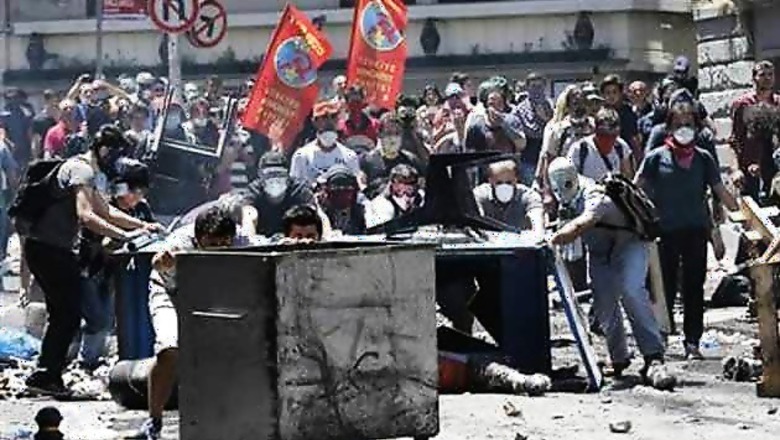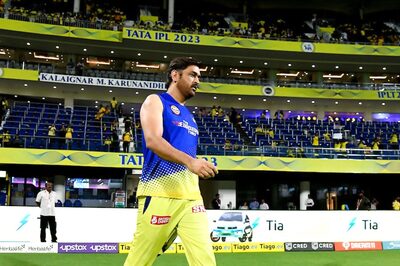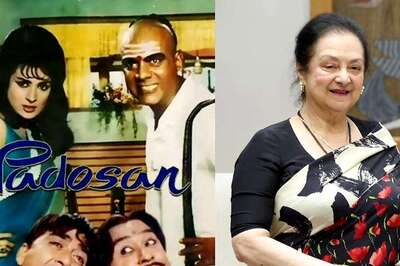
views
Istanbul: Tens of thousands of people took to the streets in Turkey's four biggest cities on Sunday and clashed with riot police firing tear gas in the third day of the fiercest anti-government protests in years.
Prime Minister Tayyip Erdogan blamed the main secular opposition party for inciting the crowds, whom he called "a few looters", and said the protests were aimed at depriving his ruling AK Party of votes as elections begin in 2014.
The unrest erupted on Friday when trees were torn down at a park in Istanbul's main Taksim Square under government plans to redevelop the area, but widened into a broad show of defiance against the Islamist-rooted Justice and Development Party (AKP).
Erdogan said the plans to remake the square, long an iconic rallying point for mass demonstrations, would go ahead, including the construction of a new mosque and the rebuilding of a replica Ottoman-era barracks.
Erdogan said the protests had nothing to do with the plans.
"It's entirely ideological," he said in an interview broadcast on Turkish television.
"The main opposition party which is making resistance calls on every street is provoking these protests ... This is about my ruling party, myself and the looming municipality elections in Istanbul and efforts to make the AK Party lose votes here."
Turkey is due to hold local and presidential elections in 2014, in which Erdogan is expected to stand, followed by parliamentary polls in 2015.
The main opposition Republican People's Party (CHP) denied orchestrating the unrest, blaming Erdogan's policies.
"Today the people on the street across Turkey are not exclusively from the CHP, but from all ideologies and from all parties," senior party member Mehmet Akif Hamzacebi said.
"What Erdogan has to do is not to blame CHP but draw the necessary lessons from what happened," he told Reuters.
The protests, started by a small group of environmental campaigners, mushroomed when police used force to eject them from the park on Taksim Square. As word spread online, the demonstrations have drawn in a wide range of people of all ages from across the political and social spectrum.
Protests on Sunday were not as violent as the past two days but police used tear gas to try to disperse hundreds of people in Ankara's main Kizilay square. There were similar clashes in Izmir and Adana, Turkey's third and fourth biggest cities.
In Istanbul's Taksim Square, the atmosphere was more festive with some chanting for Erdogan to resign and others singing and dancing. There was little obvious police presence. But there were later clashes between police and protesters near Erdogan's office in a former Ottoman palace in the city.
There were more than 90 separate demonstrations around the country on Friday and Saturday, officials said. More than 1,000 people have been injured in Istanbul and several hundred more in Ankara, according to medical staff.
The ferocity of the police response in Istanbul shocked Turks, as well as tourists caught up in the unrest in one of the world's most visited destinations. It has drawn rebukes from the United States, European Union and international rights groups.
Helicopters fired tear gas canisters into residential neighbourhoods and police used teargas to try to smoke people out of buildings. Footage on YouTube showed one protester being hit by an armoured police truck as it charged a barricade.
Erdogan has overseen a transformation in Turkey during his decade in power, turning its once crisis-prone economy into the fastest-growing in Europe.
Erdogan remains by far the most popular politician, but critics point to what they see as his authoritarianism and religiously conservative meddling in private lives in the secular republic.
Tighter restrictions on alcohol sales and warnings against public displays of affection in recent weeks have also provoked protests. Concern that government policy is allowing Turkey to be dragged into the conflict in neighbouring Syria by the West has also led to peaceful demonstrations.
On Sunday, Erdogan appeared on television for the fourth time in less than 36 hours, and justified the restrictions on alcohol as for the good of people's health.
"I want them to know that I want these (restrictions) for the sake of their health ... Whoever drinks alcohol is an alcoholic," he said.


















Comments
0 comment